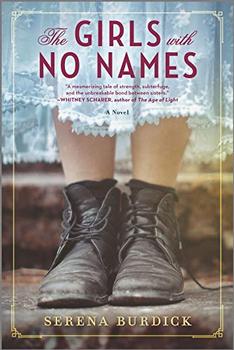Summary | Excerpt | Reading Guide | Reviews | Beyond the Book | Readalikes | Genres & Themes | Author Bio

The only person we had to look out for now was Mama's French maid, Margot, who had come with Mama from Paris. She was a solid, handsome woman, with dark hair that refused to gray and eyes the color of steel. Loyal only to her mistress, she reported our every misstep. Tonight, Margot's room off the kitchen was empty and Luella and I ate quickly, escaping to our rooms before she had a chance to return.
I was too tired to bother brushing my hair before crawling into bed with my notebook, where I would embellish our adventure into a story worthy of our tardiness. It was Daddy who encouraged my storytelling. As a child, my mind froze when people asked me questions. I'd stare at them, reaching for what they might want me to say, never finding the right words. When I was six years old Daddy gave me a notebook and a shiny black pen and said, "Your eyes are full of mystery. I love a good mystery. Why not write one for me?" After that, at least in my imagination, words flowed.
When my hand began to cramp, I slipped the book under my pillow and turned out the lamp to wait for Luella, who religiously brushed her hair one hundred times before bed. She'd read in Vogue it thickened limp strands.
Despite our separate rooms, we still slept together. When we were little our beds were so far apart in the nursery that one of us would creep across the room to climb in with the other. When Luella turned thirteen she got her own room and the nursery became mine. My twin bed was replaced with a double oak canopy, my child's wardrobe swapped out for a lovely, large one fit to accommodate all the womanly dresses I would grow into. I was only ten at the time and had high hopes for my future figure.
At thirteen it was becoming harder to pretend I'd ever grow into a dress meant to hang in that wardrobe. I had always been small for my age, but as the girls around me filled out and inched their way upward into the world of womanhood, I remained short and thin with no figure to speak of. Luella had long since left me behind. Her breasts filled out a chest that had once been as scrawny as mine, and her straight waist curved over enviable hips. Even her face had rounded out, her dimples sinking into full cheeks. But it was her fingernails I envied the most. Smooth and flat, her white cuticles like upside-down smiles, or tiny cresting moons. My cuticles were invisible under the murky lumps that grew like pebbles from my nail beds, bulbous and round as if I'd dipped my fingertips into melted wax.
Jumping into bed, Luella wriggled next to me whispering, "Wasn't it absolutely marvelous? I keep hearing the fiddles and that voice. I've never heard anything like it. It was wildly sinful, wasn't it?"
It was.
Our toes had been inches above the icy spring water at the base of the Indian caves when the music interrupted us. We had peeled off stockings for our pre-spring ritual of numbing our feet when fiddle notes pierced the air. Bewitched by a euphonious voice sailing through the trees we forgot about our mission to will the buds of flowers open, snatched our shoes and socks and scrambled up the grassy slope, halting at the tree line. The normally empty meadow was ringed with tents and brightly painted house wagons. Tethered horses munched on grass while dogs lay with heads in their paws, watching a group of people encircle a woman dancing with her hands above her head, her floral skirt swelling like the surf, voices and fiddles singing around her in circles.
Luella had wrapped her arm around my waist. I felt her body quivering. "Look at her. She's marvelous. It makes me want to move in ways I've never dared," she whispered, her desire beating off her like heat.
Since the age of five, my sister had trained as a ballerina under a Russian choreographer. The French are good dancers, our very French mother informed us, her voice lilting with her accent, but the Russians are great dancers. The Americans, she scoffed, do not know the meaning of ballet.
Excerpted from The Girls with No Names by Serena Burdick, Copyright © 2020 by Serena Burdick. Published by Park Row Books.
Your guide toexceptional books
BookBrowse seeks out and recommends the best in contemporary fiction and nonfiction—books that not only engage and entertain but also deepen our understanding of ourselves and the world around us.